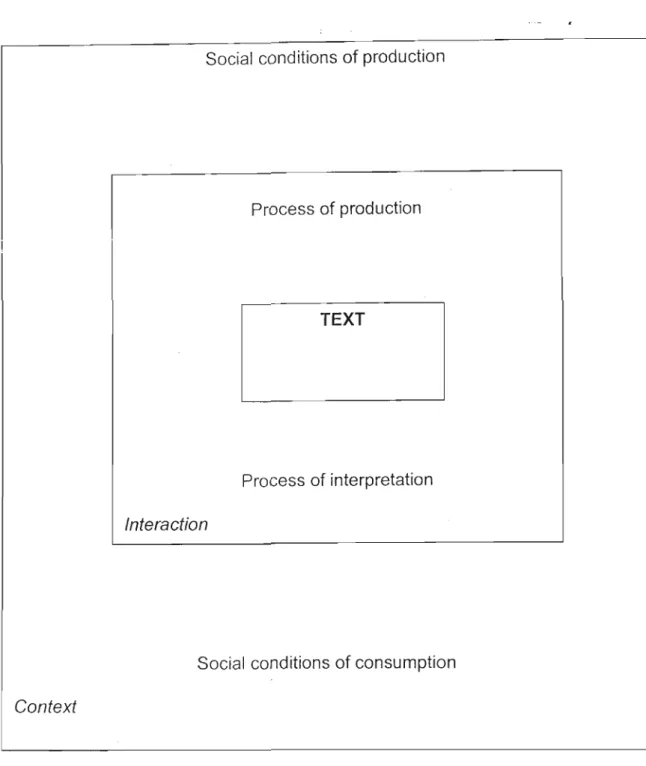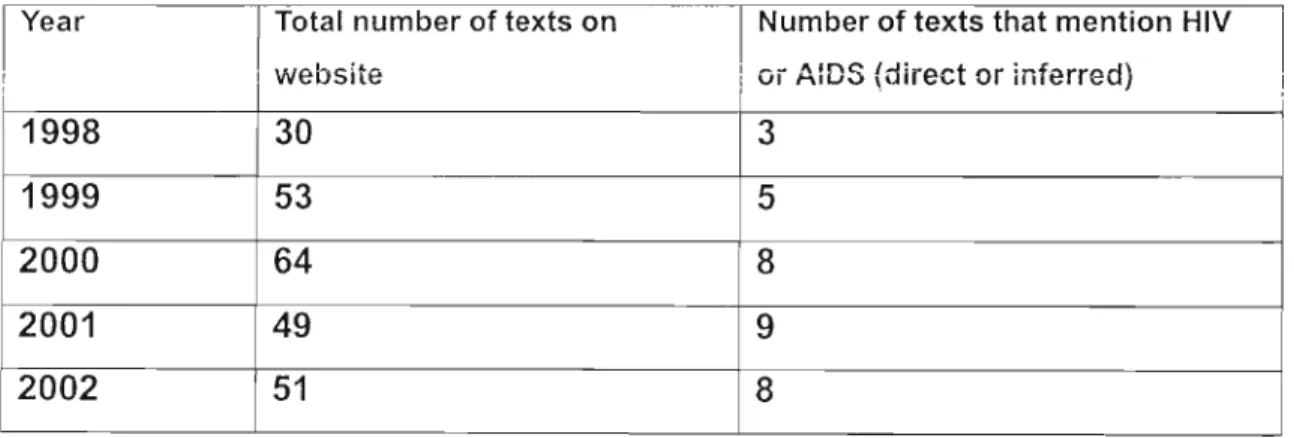This thesis is dedicated to Peter Mokaba and Parks Mankahlana, both passionate and talented young South African leaders for whom participation in the HIV/AIDS debate in this country had tragic consequences. In South Africa, the problems with HIVIAID are likely to be very acute, as South Africa has the largest population of people living with the Human Immuno-Deficiency Virus (HIV), according to the United Nations Joint Agency on HIV/AIDS (UNAIDS). ) in the world - over 4.5 million people. At the time, it was understandable that there should be skepticism that one virus could be responsible for both the strange immunodeficiency diseases in.
Theories and methodology
It includes the process of producing the text and the process of interpretation for which the text is a resource. The relationship between the text and society is not only apparent from the text's formal features. In other words, language is, so to speak, part of the action (the genre) as well as representing the action (the discourse) and it is also the pmi of the performance (the style).

Mbeki's views on HIV and AIDS
Mbeki and the orthodox view of HIVIAIDS
- General trends
This is contrary to the usual use of a slash to indicate that a person has either HIV or AIDS and may indicate that Mbeki was unaware of international conventions regarding HIV/AIDS terminology. Address to the ministerial meeting of the Non-Aligned Movement at the United Nations in New York, 23 September 1999;. IIIThis is evident in Mbcki's speech to the Intergovernmental Forum Development Planning Sunu11it (27 November J995), a speech to the ANC Youth League Congress (19 March 1998), Speech to the ministerial meeting of the Non-Aligned Movement at the United Nations in New York (23 September 1999) and his speech to the joint Houses of Parliament during the millennium debate (19 November 1999).
However, let's get to the matter that caused the latest rumpus around Virodene. In order to satisfy those who seem perversely attached to the idea that the ANC and the Government are guilty until proven innocent, the independent Public Protector will in time pronounce judgment on these cases. In the course of their interaction with the MCC, the researchers submitted at least four versions of their research proposal, the Protocol, in response to the critical evaluations of the MCC.
The Cabinet has decided to support Virodena's investigation until the MCC processes are completed. Thus there would be an assumption that those reading the article would be politically literate and also sympathetic to the ANC. Virodene and MCC researchers aimed to ensure the best possible outcome for those living with HIV/AIDS, namely "possible mercy treatment". She portrays Virodene in a favorable light and implies that there is a conspiracy against the substance by turning to "passions". sandstom1s" controversy and the "rumpus" it has caused, saying "time will tell what is behind this behavior".
The text takes some time to explain the background (not reproduced above) to the problem being addressed, namely that "the ANC has no financial stake in Virodene".
Mbeki and AIDS dissidence
But unlike in the case of Virodene, Mbeki is now raising the issue of the drug's safety and toxicity. His description of AIDS as a "disease" when it is a syndrome indicates a lack of scientific awareness about the epidemic. HIV/AIDS in Africa is so different from that in the West that it is doubtful whether it can have the same cause and should be addressed in the same way as in the West.
He was driven by fear of the effect the comments could have on the profitability of the product. The tragedy is that HIVAIDS will not succumb to the machinations of profitable pharmaceutical companies and their propagandists. We will not avoid this obligation in favor of the convenience of reciting the catechism, which may be a very correct response to the particular manifestation of AIDS in the West.
It is very strange that we all seem ready to serve the cause of the fanatics by deciding to stand and wait. Style: The tone of the letter is formal and explanatory, but it is also written in a straightforward style. 34; international agencies such as UNAIDS" that sub-Saharan Africa is responsible for "two-thirds of the global incidence of HIV-AIDS".
This is one of the main arguments of the dissidents, who say that it is impossible to attribute the Western version of AIDS and immunity in Africa to the same virus.
Mbeki and his critics
These opponents remain our opponents, no matter how much they now pretend to care about the integrity and revolutionary purity of our movement and government and the welfare of the masses of our people. In March 2002, the ANC soon sent an unusual document entitled "Castro Hlongwane, Caravans, Cats, Geese, Foot and Mouth and Statistics" to the ANC. The document enjoyed exceptional protection within the ANC, again suggesting that it was supported by influential members of the party.
Instead of being condemned by the ANC hierarchy for contradicting the government's official position on HIV/AIDS, ?vlokaba was given the right to distribute it to the ANC NEC, MPs and other leaders in the party. It is therefore impOliant to note as a significant text in the fight against HIVIAIDS in South Africa. Mankahlana spoke of the "marauding military-industrial complex,2o pushing antiretroviral drugs as a response to the epidemic in the same way that the Hlongwane document speaks of the "all-powerful apparatus" that touts drugs to ensure large profits.
To quote Carter Woodson, they studied in theological schools where the Bible was interpreted by those who justified separation; law schools where they are told they belong to the most criminal element in the country; medicai schools where they are likewise convinced of their inferiority by being reminded of their role as. Convinced that we are but natural-born, promiscuous carriers of germs, unique in the world, they proclaim that our continent is doomed to an inevitable mortal end because of our invincible devotion to the sin of lust. However, he uses the argument of racism to get his audience rather inappropriate to support the second discourse of his speech, namely that those who believe in the rampant spread of HIV/AIDS in the country are racists and are therefore by implication.
In contrast, the “Negroes of enslaved minds” and the “ill-educated natives” believe in their own inferiority as “the most criminal element in the country.”
Civil society responses to Mbeki's views on HIV and AIDS
Conclusion
Moreover, the controversy that arose when Mbeki decided to defend and promote Virodene, and the subsequent discovery that the substance was little more than an industrial solvent, may have played a role in Mbeki's growing skepticism about a drug-based response to HIV/AIDS. This skepticism may have eventually led Mbeki to question the role of the pharmaceutical companies in addressing HIV/AIDS, and it may have led him to consider the theories propagated by the AIDS dissidents. In dealing with his critics, he often dismissed those who opposed his views on HIV/AIDS as racist without addressing their substance.
This is a common Mbeki tactic that serves to divert public attention from the content of the criticism to an emotive issue such as racism. This was after he had admitted to both Parliament and the ANC National Executive Committee that his views on HIV/AIDS had caused confusion. In addition, it tried to secure natural medicines and immune boosters, such as the African potato, offered as an alternative to antiretroviral drugs as part of the national antiretroviral operational plan (personal interview, members of the team advising the government on ARV dissemination).
The largest survey on HIV/AIDS with a sample of 10 000 people released in November last year found that over 90% of South Africans of all races believed that the government should supply citizens with ARVs in public health .23 It remains unclear whether the government's move to ARV-out is supported by Mbeki and, if so, whether it indicates that he has changed his views or whether this is a calculated political decision to ensure that the ANC government does not lose support and votes. Not the least of these are the intense lobbying within the government and the ANC for the orthodox position, the massive mobilization of citizens by organizations such as TAC, Cosatu and faith-based organizations and the sheer weight of the HIVIAIDS epidemic, which has fundamentally changed the patterns . diseases and deaths in this country. March 14: Answer to the Leader of the Opposition's question, Parliamentary Question Time (on declaring a state of emergency for AIDS).
6 January: Speech on the occasion of the 90th anniversary of the ANC 1- 7 February: Letter from the President, ANC Today (VoI2, No 5) 8 February: State of the Union Address, Parliament.
Bibliography
In T van Dijk (ed.) Discourse as social interaction. 1999) 'Democracy and the Public Sphere in Critical Inquiry. A critical historical analysis of government responses to HIV/AIDS in South Africa as reported by the media. Unpublished paper presented at the AIDS in Context Conference, Johannesburg. There is something missing in the discussion of mother-to-child transmission.'
2002) 'State and civil society in contemporary South Africa: Redefining the rules of the game' in Jacobs, Sand R Calland (eds). 'A long illness: Towards a history of NGO, government and medical discourse around AIDS policy-making in South Africa.'. Honors Mini-thesis University of Natal Castro Hlongwane, caravans, cats, geese, foot-and-mouth and statistics: HIV/AIDS and the struggle for the humanization of the Afrikaner.'.
34;On the fault line: the politics of AIDS policy in contemporary South Africa Denial and defiance: a socio-political analysis of AIDS in South Africa. January 21: Mbeki calls Rasnick in the US and asks if Rasnick will help him answer questions about HN, AIDS and AZT. 21 August: TAC, Dr Haroon Saloojee and the Child Rights Center file a notice of motion in the Pretoria High Court that they intend to compel the Minister of Health and her provincial MECs to make Nevirapine available to pregnant women with HIV giving birth in the public health sector, and to their babies, where medically indicated in the judgment of the attending medical practitioner or health professional.
March 28 - The government announces that it will appeal the Pretoria High Court ruling ordering it to provide nevirapine to HIV-positive pregnant women, in the Constitutional Court.
